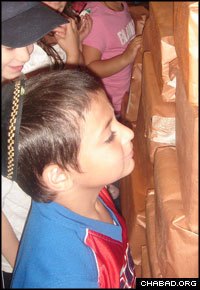How much Hebrew can an American preschooler pick up over the course of a six-week summer camp?
The answer, according to Zeesy Posner, is quite a lot.
Reached just before the end of the inaugural year of the Hebrew immersion summer camp she ran, Posner, co-director of Chabad-Lubavitch of Skokie, Ill., reports that the two dozen campers of Keitana B’Ivrit – a branch of the worldwide Camp Gan Israel network of summer camps – are comfortable and confident in a language most of them had very little knowledge of before June.
“Preschoolers can totally go with the flow, and have no problem with two languages,” says Posner, who runs the camp as a unit of her larger 150-strong Junior Camp Gan Israel of Skokie.
Educators have known for quite some time the truth in Posner’s remarks, but the Chabad-Lubavitch emissary says that to her knowledge, a Hebrew-language summer camp for young English-speaking children just didn’t exist before her program’s founding. Other camps across North America offer programs in everything from French and Spanish to Italian and Chinese, but Hebrew immersion – where the camp’s entire staff of counselors and group leaders are native Hebrew speakers – is a rarity.
According to Posner, the very nature of a preschool summer camp eases the acquisition of a second language. Far from the demands of a rigorous academic environment, the children pick up Hebrew through everyday play and sing-alongs.

“The guiding principle of the camp is to give the children a happy, exciting Jewish experience,” says Posner. “Every child should leave our camp feeling good about being Jewish.
“The only difference between our Hebrew program and the regular summer camp is that we conduct our activities in Hebrew,” she adds. “For instance, instead of singing 'Hashem is here' in English, we’ll sing it in Hebrew.”
Elyse Litwak appreciates the approach. For the past three years, the American has spoken Hebrew at home in an attempt to raise a bilingual daughter. She enrolled her in the Skokie program to reinforce those efforts.
“It’s fantastic,” she says of the camp. “She gets the whole family into it. She comes home smiling and singing beautiful songs in Hebrew.”
Published studies attest to the ability of young minds to grasp secondary languages, although research has not yet explained why children can pick up other languages with such relative ease.
“Knowing Hebrew is fundamental to a Jewish education,” she says. “For the children, it gives them pride in being Jewish and will make their Torah learning much easier.”
Dana Barhom, an Israeli expatriate who has lived in the United States for the past nine years, sent her daughter to the camp to make her Hebrew skills “more sharp.”
“It really feels like home for her there,” she says. “As an Israeli, she knew Hebrew better than the other kids, and helped teach them different [phrases]. I think every kid should learn a bit of Hebrew.”





Start a Discussion